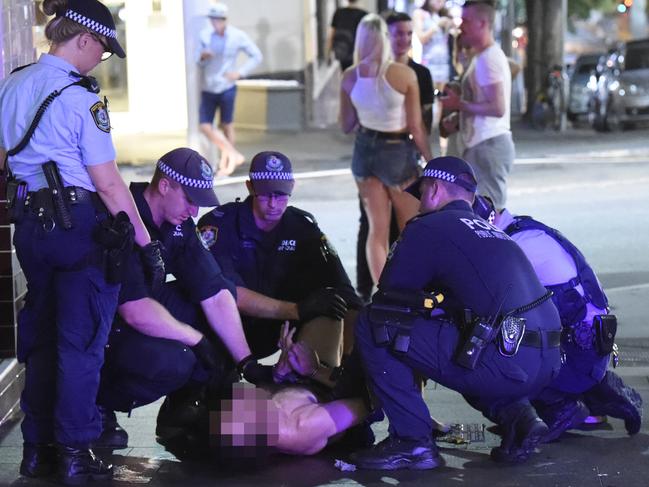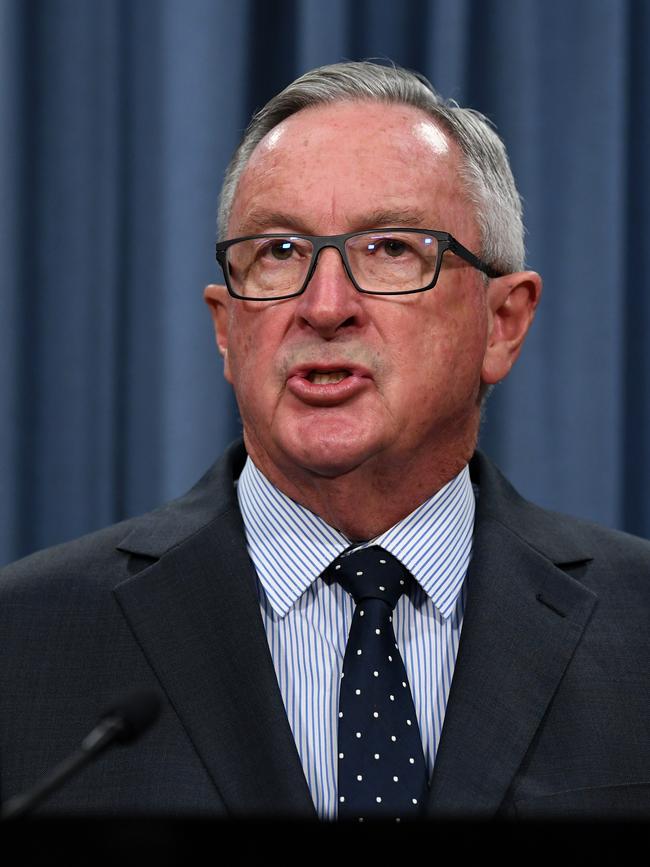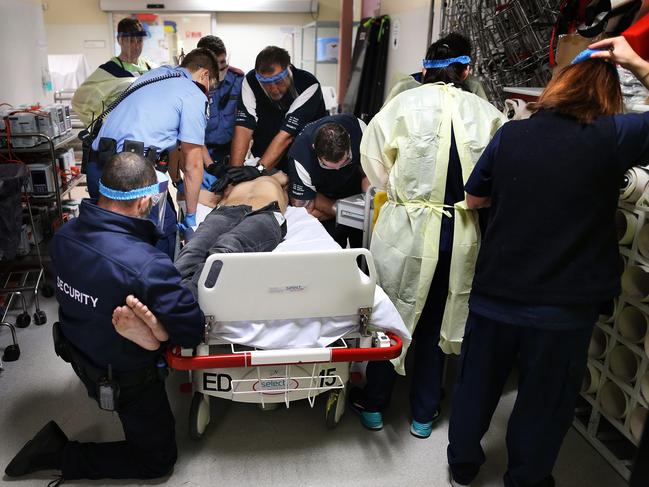Hand-picked commissioner slams government’s ‘tired, unimaginative’ drug policies
NSW Premier Gladys Berejiklian has been left red-faced after the professor hand-picked to solve the ice crisis slammed the state’s drug policies as ‘tired and lacking in imagination’, and handed down recommendations ministers have already rejected.
NSW
Don't miss out on the headlines from NSW. Followed categories will be added to My News.
- Bizarre ways drug syndicates are getting meth into Sydney
- Four-part special: Human toll of ice addiction in NSW
The state government has been left embarrassed after the professor hand-picked to solve the ice crisis landed ministers with a raft of suggestions they have already rejected.
Opening up more injecting rooms, ditching drug detection dogs at music festivals, limiting strip searches, making ice pipes legal, and decriminalising the personal use of ice were among the controversial recommendations handed down on Thursday by ice inquiry head Professor Dan Howard.

The former crown prosecutor, who helped prosecute backpacker killer Ivan Milat, slammed the government’s drug policies as “tired and lacking in imagination”.
He said there was shocking evidence ice was easier and cheaper to get in some country towns than it was to buy a packet of cigarettes over-the counter at a store.
He said in Nowra, one person likened the local dealer to a pizza delivery man.
MORE NEWS
Roosters coach’s $150k Mercedes stolen while family slept
Woman allegedly lit home on fire after argument with boyfriend
MAFS’ Poppy set to take things further with Channel 9
“One of the communities out at home … one of the fellas delivers ice like he’s the pizza man. The whole community sees the car drive in. People walk out, collect it like it’s a pizza, and he just drives away,” the man told the inquiry.
Prof Howard has called for trials to give prisoners needles and syringes behind bars and allowing pregnant women and juveniles as young as 16 to use injecting rooms to smoke ice.
The Special Commission of Inquiry had been told that the demand for treatment of pregnant women at the Kamira Drug and Alcohol Treatment Services in Wyong had soared more than 500 per cent in two years with nearly all expectant mothers seeking treatment there using crystal meth throughout their pregnancy.
He said general practitioners were well placed to be in the frontline and could be trained to screen for amphetamine use with special item numbers for drug treatments on the Medicare Benefits Schedule which would mean more money for the GPs.
The inquiry that cost millions of dollars and toured the state also recommended clinically supervised testing of drugs, including mobile pill testing.
Launching the inquiry in 2018, NSW Premier Gladys Berejiklian said she was “convinced” that it would find no evidence to support pill testing.
Professor Howard called for political leadership as he said Australia had the highest rate of amphetamine dependence in the world.


But Health Minister Brad Hazzard yesterday said that five of the key recommendations, including additional medically supervised injecting centres, pill testing, syringe programs in jails and ending the use of drug detection dogs, had already been rejected.
Mr Hazzard said the other 104 recommendations were being considered.
He said the report of the Special Commission of Inquiry’s recommendations cut across health, social and criminal justice issues, which required a whole-of-Government response across portfolios. The government was investing $231.6 million on preventing and treating harms associated with drug use and ensuring people had access to care and support, including $4 million to buy non-government treatment services in rural and regional NSW.
Professor Howard, who also served on the NSW Mental Health Tribunal, said it was clear that policies were not working.

“Our policies are tired, lacking in imagination and out of step with best practice worldwide; they are simply not working, and the resources allocated to harm reduction and treatment are insufficient,” he said in the 1200-page report.
He said the policy of “saying no” to drugs didn’t work.
“Criminalising use and possession encourages us to stigmatise people who use drugs as the authors of their own misfortune,” he said in the report.
“It gives us tacit permission to turn a blind eye to the factors driving most problematic drug use: trauma, childhood abuse, domestic violence, unemployment, homelessness, dispossession, entrenched social disadvantage, mental illness, loneliness, despair and many other marginalising circumstances.”
The report found that the criminal law towards use and possession of drugs had failed to have any significant impact on the illegal drug use.
“Australia has the highest rate of amphetamine dependence in the world and … the highest rate of all-cause deaths associated with amphetamine dependence,” Professor Howard said.
The cost of crystal methylamphetamine or ice had crashed from up to $220,000 per kilo nine years ago to between $80,000 and $100,000
A kilo of MDMA had slumped from $60,000 to $20,000 in six years.
Many of the recommendations echo those already made by Deputy State Coroner Harriet Graham following inquests into drugs deaths including the six young people at music festivals.
Professor Howard said the use of drug dogs led to panic ingestion or preloading before music festivals.

He said the last NSW Health Drug and Alcohol Plan expired a decade ago and called on the NSW Government to adopt a fresh comprehensive Drug and Alcohol policy.
“Unfortunately, since 2006 the momentum of drug and alcohol policy and program development in NSW has stagnated considerably — so much so that NSW currently has no formal drug policy plan in place,” he said.
“Recognising illicit drug use as a health and social problem rather than a criminal justice issue is a fundamental first step.”
Royal Australian College of General Practitioners president Dr Harry Nespolon said they welcomed the inquiry’s recognition “of the vital role GPs and their teams play in helping people address alcohol and other drug use including ice”.
NSW Police said they were considering all the recommendations and would “provide a response in due course”.
